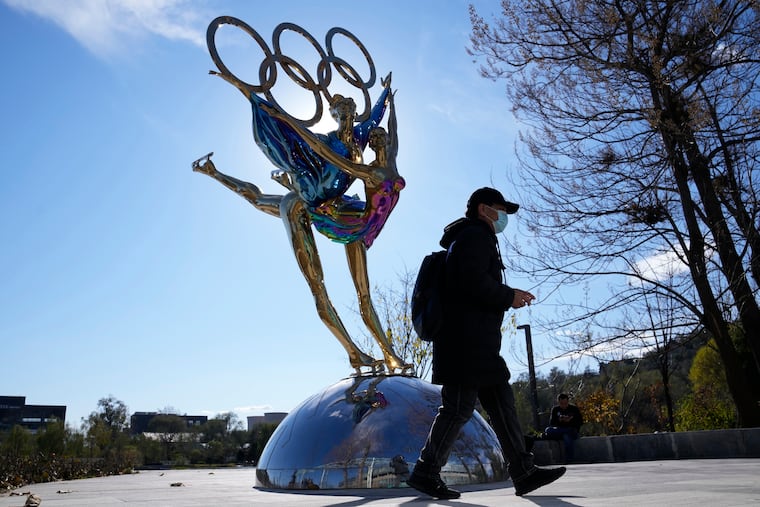U.S. diplomatic boycott of Olympics pushes back at Beijing’s efforts to control sports stars | Trudy Rubin
China's repression of Uyghurs and the disappearance of tennis star Peng Shuai spurred the decision not to send any U.S. officials to the 2022 Beijing Winter Olympics.

In 1936, human rights advocates pushed for a boycott of the “Nazi Olympics,” two years after Adolf Hitler seized power and began persecuting Jews.
Some critics claimed the move was hypocritical given the ongoing discrimination against Black people in the United States. In the end, however, the games went on, with Black U.S. track star Jesse Owens winning four gold medals. Thus, the 1936 games dealt a blow to Nazi claims of “Aryan” racial supremacy.
Fast forward to the upcoming 2022 Winter Olympics in Beijing. The White House has announced a diplomatic boycott of the games due to massive Chinese human rights violations. This means no U.S. officials will attend but athletes will compete.
Some critics dismiss this as a meaningless snub that will only irritate China, while others demand a full U.S. boycott, including athletes.
I think the Biden team made exactly the right call.
» READ MORE: The world asks China #WhereIsPengShuai? | Trudy Rubin
A full boycott of the Olympics would not have been fair to the athletes who have trained for years for this moment. Rather than change Chinese behavior, it would probably have led to a tit-for-tat Chinese boycott of future games in the United States.
Yet, there was no way these Olympics could have been treated as normal. China’s human rights repression not only violates Olympic principles but is now trying to control the free speech of athletes not only in China but all over the globe.
“We have to start from the premise that Beijing should never have gotten the games to begin with, if we had known what we know now,” says Michael Abramowitz, the head of Freedom House, which tracks the global status of human rights and democracies.
Indeed, since the International Olympic Committee (IOC) awarded Beijing the games, the world has learned about the massive Chinese government repression of hundreds of thousands of Muslim Uyghurs in Xinjiang, who have been sent to “reeducation” camps. While not Hitlerian in death toll, this certainly smacks of cultural genocide and hideous repression.
Even beyond the Uyghur horrors, and China’s crushing of Hong Kong democracy, there is a more immediate sports issue that makes it impossible not to protest these games in some form.
That issue can be described in a hashtag: #WhereisPengShuai?
It has been five weeks since the Chinese tennis star disappeared — following her social media post that she had been sexually assaulted by a former top Communist official. The world has still not seen her in person, except in two obviously staged video calls in the company of party minders. Her social media posts have been scrubbed and her whereabouts are still unknown.
If China can simply “disappear” a sports star who angers party leaders — as it has disappeared so many others who have challenged the party — how can the world’s most prestigious sports event ignore this crime?
IOC president Thomas Bach abased himself by claiming, after watching the videos: “We could not feel her being under pressure.” Bach claimed the IOC couldn’t take “political sides.” Apparently, taking a stand for athletes’ freedom of expression was too dangerous for the head of the IOC.
Peng’s case reminds us of how Western athletes, celebrities, sports leagues, and corporate sponsors have kept silent about Chinese human rights violations, lest they lose out on profits. Who can forget the National Basketball League’s apology after a Houston Rockets official, Daryl Morey, tweeted support for Hong Kong pro-democracy protesters?
China’s streaming giant Tencent dropped broadcasts of Rockets games in the lucrative Chinese market — until Morey left to become president of operations of the Philadelphia 76ers, whereupon Tencent began blacklisting Sixers games.
And then there is the case of the Boston Celtics’ center Enes Kanter, who has criticized China’s repression in Tibet. He wrote an essay on Nov. 20 in the Wall Street Journal calling for the Winter Games to be moved from Beijing “for Peng Shuai’s sake.” Celtics games were added to China’s streaming blacklist after Kanter’s critiques.
» READ MORE: Biden's Summit for Democracy must address backsliding at home | Trudy Rubin
But China’s repression of Peng Shuai, as the Olympics near, may have jolted the sports world in a way that will make a difference. Besides Kanter’s courage, a stream of sports stars including tennis greats Naomi Osaka and Serena Williams have demanded her freedom. The Women’s Tennis Association canceled lucrative tournaments in China until there is proof of Peng’s safety and an investigation of her charges.
And international pressure is mounting for corporate sponsors of the Winter Games to hold China publicly accountable — for gross human rights abuses and the fate of Peng Shuai.
So the U.S.-led diplomatic boycott — which so far is joined by Canada, Britain, and Australia — makes a global statement that Chinese repression not only violates Olympic ideals but threatens athletes worldwide. If a Chinese tennis star — or an American basketball player — cannot speak her or his mind without being punished by China, this shines a spotlight on Beijing’s demeaning of the sports world.
The growing diplomatic boycott of the Olympics signals that the world is finally on guard.